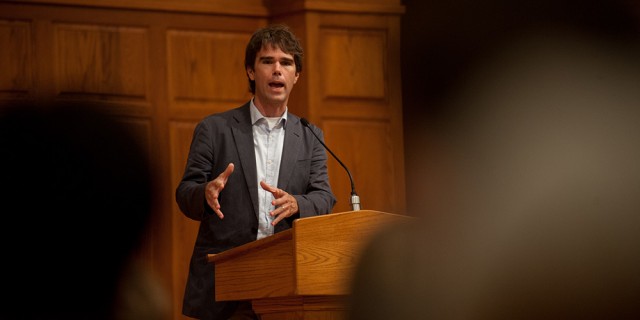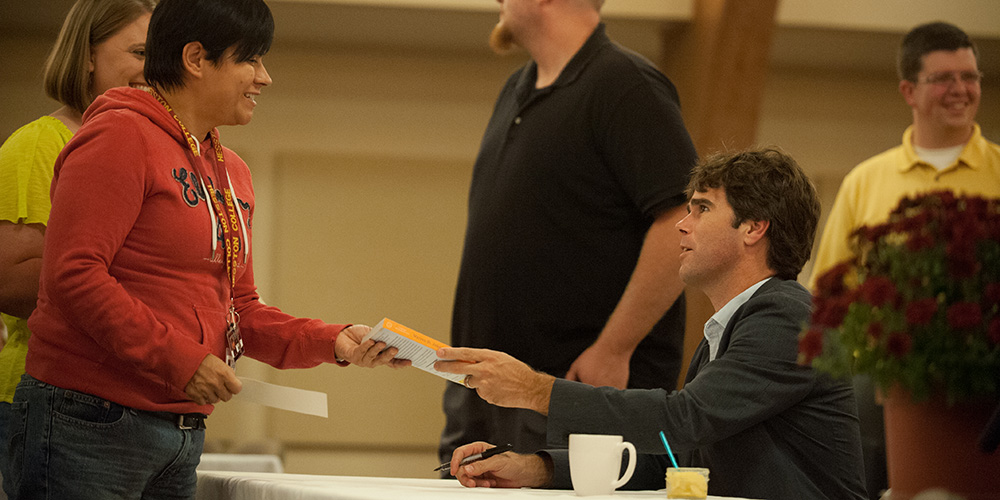Remaining comfortable does not allow for change or growth. That’s the wisdom author and former New York Times journalist Warren St. John shared with Hesston College students, faculty, staff and community members during a presentation of his experiences researching his book “Outcasts United: An American Town, A Refugee Team, and One Woman’s Quest to Make a Difference” (Spiegel & Grau, 2009) Sept. 19.
“Outcasts United” recounts the journey of refugees settling into and adapting to American life in the small southern town of Clarkston, Ga., through the experiences of a refugee boys’ soccer team. The story illustrates the challenges and rewards that come with creating community in an atmosphere where people do not seem to have much in common – a situation that St. John reminded the audience is common not only in refugee resettlement, but for many life experiences, including college as students enter a new place with people from different backgrounds, cultures and life.
“I genuinely feel this story has something to say for many aspects of life,” said St. John. “What was happening in the Clarkston community was so complicated and the lessons so complex, I wanted the reader to be able to come to their own realizations and draw their own conclusions for practical life application.”

Spearheaded by Hesston College’s First Year Experience, St. John’s book is being used as the college’s campus-wide common read for the 2013-14 year with the theme Extending Home: Stories of Migration and Transformation.
Migration – or rather refugees being flung into a new place and completely foreign society for political, religious or safety reasons – is the means by which St. John was able to illustrate what much of the United States will likely face as refugee resettlement continues in earnest and the country’s demographics continue to shift.
“Refugee resettlement was moving at such a fast pace in Clarkston, it was like seeing the United States in fast forward and glimpsing the problems and solutions much of the country will see in 10 or 20 years,” said St. John.
Representatives from area refugee resettlement agencies Episcopal Wichita Area Refugee Ministry (EWARM) and the Wichita branch of the International Rescue Committee (IRC) were also present to offer more information about how the refugee experience is impacting south central Kansas.
Since the IRC arrived in Wichita in 2011, they have helped resettle about 200 refugees and hope to assist 160 more in the next year.
“A lot of communities are scared when they hear about people migrating and settling among them,” said Sain Lengeju, a volunteer with IRC who migrated from Kenya and is working toward her masters in social work at Wichita State University. “St. John’s book and the way Hesston College is using it is important because it shows people that refugees are human beings.”
A man who simply goes by Okita arrived in Wichita from the Democratic Republic of the Congo four months ago and says he was surprised at how welcoming the community was.
“It is challenging coming to a new home, but many people have welcomed me and helped me become independent, and that is encouraging,” he said.
Transformation, St. John said, is what happens when people reach out and embrace change, differences and stepping outside their comfort zone, and it is the key to thriving despite change.
“Being comfortable is not the best strategy for getting the most out of an experience,” St. John said. “The lesson I learned is that if you embrace change and power through the awkward moments, you will be rewarded.”
Transformation is also a message Hesston College’s First Year Experience coordinators hope students will discover as they work with and research the Extending Home theme this year.
“It is events like this that help students reflect on their own migration to a new community,” said Hesston faculty member and FYE co-coordinator Karen Sheriff Levan. “I hope they will find connections and gain empathy from others’ stories of migration and transformation.”


